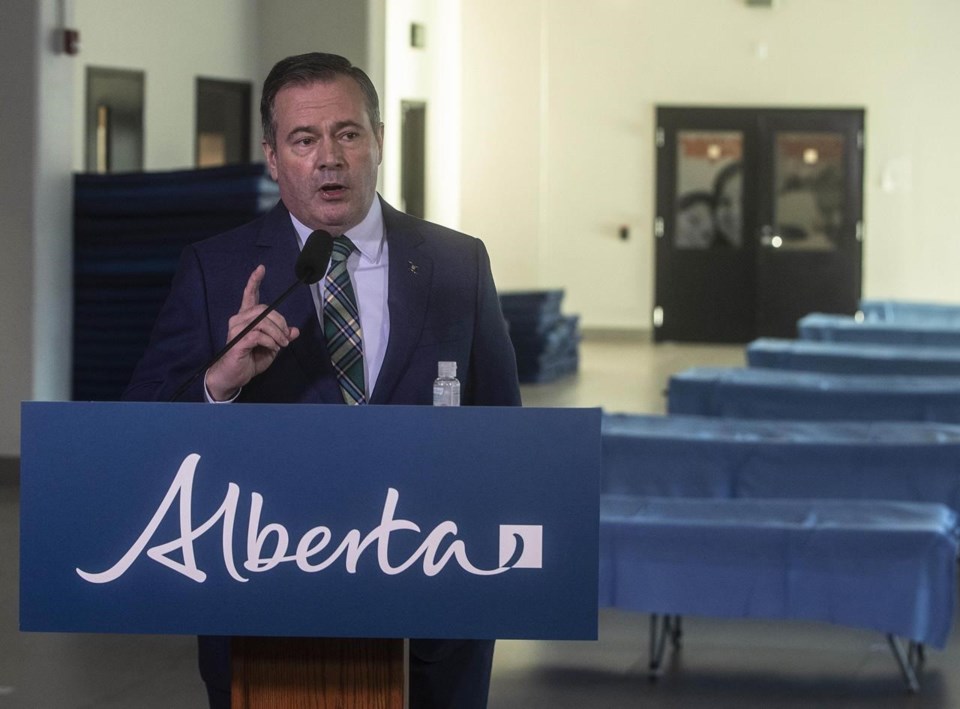EDMONTON — Alberta is expanding vaccine eligibility, buying more COVID-19 rapid tests and imposing new capacity limits and rules in a battle against the wildfire-fast Omicron variant.
The changes include half-capacity attendance for the upcoming world junior hockey championship, set to begin Sunday in Edmonton and Red Deer.
“More must be done urgently to protect our health-care system from the potential threat of Omicron,” Premier Jason Kenney said Tuesday.
Dr. Deena Hinshaw, Alberta's chief medical officer of health, said there were 1,609 Omicron cases in the province — an increase of nearly 600 from the day before.
She said the variant case count is doubling every two to three days.
“Omicron is now our dominant strain and there is increasing community transmission in the province,” said Hinshaw.
“If someone tests positive for COVID, they should assume they have the Omicron variant.”
Kenney said vaccines remain the best defence against severe outcomes from Omicron.
To that end, he announced anyone 18 and older can book a third booster shot, provided the second one was more than five months ago. A week ago, the province expanded booster eligibility to those 50 and older and to all health-care workers.
Health Minister Jason Copping said new limits on large events and public gatherings will work to further slow transmission.
Starting Friday, venues with a capacity above 1,000 people will be capped at half capacity. Venues with a capacity of 500 to 1,000 will be limited to 500.
Attendees must be masked at all times. Food and drink can’t be consumed in seats or at intermission to ensure masks are worn throughout.
“We need to avoid superspreader events,” said Copping.
Hockey Canada executives Tom Renney and Scott Smith said they are working to implement the 50 per cent capacity rule for the world juniors.
“The event ticketing team is currently addressing the implementation of this change and will be in contact with all ticket holders by the end of the day on Thursday,” they said in a statement.
“No further ticket information is available at this time.”
The restrictions will also apply to upcoming Edmonton Oilers and Calgary Flames hockey games. Those National Hockey League teams have had games cancelled in recent days due to leaguewide COVID-19 outbreaks.
Restaurants and bars complying with the provincial version of the vaccine passport also face new rules.
They will be limited to 10 people per table with no recreational activities, including dancing or billiards. They must also cease serving alcohol by 11 p.m. and close 90 minutes after that.
Those not participating in the vaccine passport program still cannot offer indoor dining.
Household gatherings remain limited to 10 people, not including children, and guests can come from multiple households. They can include vaccinated and unvaccinated guests.
Copping urged Albertans to reduce their social interactions during the holidays.
“Look at going to one family dinner instead of two,” said Copping, adding the government also wants businesses to cancel holiday parties.
Kenney said the government has distributed 2.5 million free rapid COVID-19 tests in recent days through health-care sites and pharmacies.
He said the province is asking the federal government for more and is purchasing from a private supplier an extra 10 million that it hopes to make available in early January.
Opposition NDP health critic David Shepherd lauded Kenney for the changes to vaccine eligibility and for distributing more test kits.
But he said the premier is failing by refusing to reverse the rule imposed last week allowing the vaccinated and unvaccinated to mingle at holiday get-togethers.
“This premier continues to be way off course,” said Shepherd.
“Jason Kenney and his UCP government are gambling with the lives and livelihoods of Albertans by refusing to reverse their reckless decision to give their blessing to unvaccinated Albertans to gather indoors.”
Hinshaw reported 786 new cases of COVID-19 for a total of 6,045 active cases. There were also two more COVID-19-related deaths, bringing that total to 3,294.
There were 329 people in hospital, including 69 in intensive care. In pre-pandemic days, Alberta had a maximum 173 ICU beds, but officials have been adding ad hoc spaces since then and had to more than double capacity in the last wave to meet demand.
This report by The Canadian Press was first published Dec. 21, 2021.
Dean Bennett, The Canadian Press
Note to readers: This is a corrected story. A previous version said there were 6,045 active Omicron cases and 6,405 active cases.



